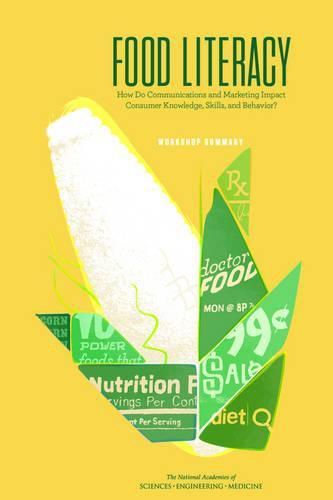Readings Newsletter
Become a Readings Member to make your shopping experience even easier.
Sign in or sign up for free!
You’re not far away from qualifying for FREE standard shipping within Australia
You’ve qualified for FREE standard shipping within Australia
The cart is loading…






In September 2015, the National Academies of Sciences, Engineering, and Medicine’s Food and Nutrition Board convened a workshop in Washington, DC, to discuss how communications and marketing impact consumer knowledge, skills, and behavior around food, nutrition, and healthy eating. The workshop was divided into three sessions, each with specific goals that were developed by the planning committee:
Session 1 described the current state of the science concerning the role of consumer education, health communications and marketing, commercial brand marketing, health literacy, and other forms of communication in affecting consumer knowledge, skills, and behavior with respect to food safety, nutrition, and other health matters.
Session 2 explored how scientific information is communicated, including the credibility of the source and of the communicator, the clarity and usability of the information, misconceptions/misinformation, and the impact of scientific communication on policy makers and the role of policy as a macro-level channel of communication.
Session 3 explored the current state of the science concerning how food literacy can be strengthened through communication tools and strategies.
This report summarizes the presentations and discussions from the workshop.
$9.00 standard shipping within Australia
FREE standard shipping within Australia for orders over $100.00
Express & International shipping calculated at checkout
In September 2015, the National Academies of Sciences, Engineering, and Medicine’s Food and Nutrition Board convened a workshop in Washington, DC, to discuss how communications and marketing impact consumer knowledge, skills, and behavior around food, nutrition, and healthy eating. The workshop was divided into three sessions, each with specific goals that were developed by the planning committee:
Session 1 described the current state of the science concerning the role of consumer education, health communications and marketing, commercial brand marketing, health literacy, and other forms of communication in affecting consumer knowledge, skills, and behavior with respect to food safety, nutrition, and other health matters.
Session 2 explored how scientific information is communicated, including the credibility of the source and of the communicator, the clarity and usability of the information, misconceptions/misinformation, and the impact of scientific communication on policy makers and the role of policy as a macro-level channel of communication.
Session 3 explored the current state of the science concerning how food literacy can be strengthened through communication tools and strategies.
This report summarizes the presentations and discussions from the workshop.